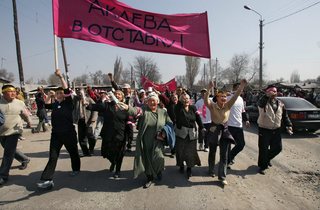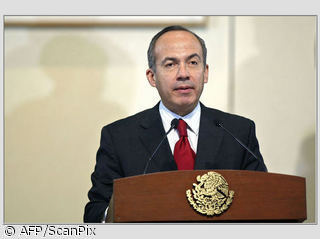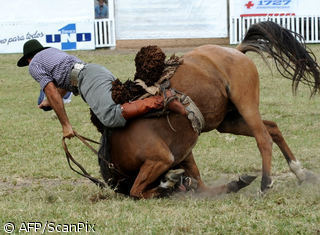Flashmobs are the latest craze in Europe this summer
Published:
18 August 2003 y., Monday
Flashmobs are the latest craze in Europe this summer. It’s another scorching day in Berlin, and on the Alexanderplatz in the city’s center, people are sitting on the edge of a fountain, hoping to catch some relief from the heat. A few are standing around in curious expectation. An Internet site had said a flashmob would take place at 5:00 p.m. But at 4:59 there was no trace of anything out of the ordinary.
Then at five on the dot, a circle of some 10 people suddenly convened around the fountain from out of nowhere. They were all young men in their 20s. Each took off his left show and passed it to his neighbor. Within about 15 seconds, the shoes had made a full circle and were back with their owners. The men gave themselves a high-five and dispersed without a trace. All that was left after their departure were amused and slightly confused onlookers, wondering what they just say.
Flashmobs, or spontaneous gatherings of people engaged in somewhat pointless activities, are the most recent U.S. import. In June of this year, the first such event took place in a Macy’s department store in New York. Since then, the concept has spread quickly across the United States, and leapfrogged over to Australia, Singapore and, as of the end of July, made its way to Europe.
In Germany, flashmobs have become very popular among a mostly young, computer-savvy group. More than 150 towns and cities have been the sites for the blitz-like gatherings, and in Berlin, at least two or three of the brief nonsensical events are announced every day on various Web sites, e-mail lists and mobile phone messages.
Šaltinis:
dw-world.de
Copying, publishing, announcing any information from the News.lt portal without written permission of News.lt editorial office is prohibited.
The most popular articles
 Civil unrest in Kyrgyzstan last week left over 70 people dead, more than 1500 injured and over 500 hospitalized.
more »
Civil unrest in Kyrgyzstan last week left over 70 people dead, more than 1500 injured and over 500 hospitalized.
more »
 After lots were drawn, ten winners of Danske Bankas scholarships and one winner of an iPod shuffle player were established.
more »
After lots were drawn, ten winners of Danske Bankas scholarships and one winner of an iPod shuffle player were established.
more »
 The health of Chinese civil rights activist Hu Jia is causing real fears after reports that the winner of the Parliament's 2008 Sakharov human rights prize is ailing with liver disease.
more »
The health of Chinese civil rights activist Hu Jia is causing real fears after reports that the winner of the Parliament's 2008 Sakharov human rights prize is ailing with liver disease.
more »
 Nestled in the northeast plains of India, Bihar is one of the poorest states in the country. Its per capita income is just a fraction of that in other Indian states.
more »
Nestled in the northeast plains of India, Bihar is one of the poorest states in the country. Its per capita income is just a fraction of that in other Indian states.
more »
 One day after a 7.2 magnitude earthquake rattled the Mexico-California border area, Mexico‘s President visits one of the affected areas.
more »
One day after a 7.2 magnitude earthquake rattled the Mexico-California border area, Mexico‘s President visits one of the affected areas.
more »
 Roma communities, the European Union’s largest ethnic minority, continue to face persistent discrimination and segregation.
more »
Roma communities, the European Union’s largest ethnic minority, continue to face persistent discrimination and segregation.
more »
 This the sound of spring for many in Latvia. With a little guidance from their parents, children at the Riga Zoo made bird boxes in anticipation of the returning migrating birds.
more »
This the sound of spring for many in Latvia. With a little guidance from their parents, children at the Riga Zoo made bird boxes in anticipation of the returning migrating birds.
more »
 Economic shocks are taking a toll on a population already facing high risks in low-income countries: children.
more »
Economic shocks are taking a toll on a population already facing high risks in low-income countries: children.
more »
 As celebrations for Easter week get under way millions of the faithful will be heading to Churches across Europe to mark the crucifixion and resurrection of Christ.
more »
As celebrations for Easter week get under way millions of the faithful will be heading to Churches across Europe to mark the crucifixion and resurrection of Christ.
more »
 More than 200, 000 riders and their horses are in Uruguay’s capital for South America’s largest rodeo.
more »
More than 200, 000 riders and their horses are in Uruguay’s capital for South America’s largest rodeo.
more »